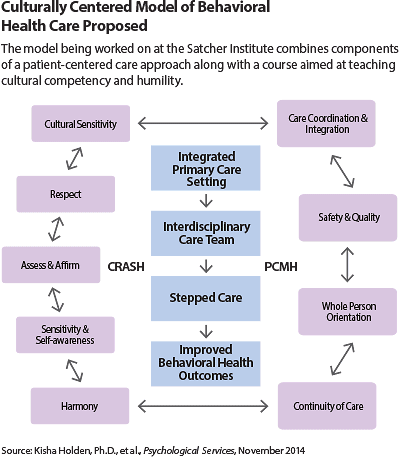Integrated Care Can Be Improved By Better Understanding of Culture
Abstract
A recent study highlights differences in physician decisions depending on the race of the patient; focusing on cultural competency may be one way to alleviate such biases in health care settings.
Over a decade ago, a pair of landmark reports—one from the surgeon general’s office, the other from the Institute of Medicine—highlighted the racial and ethnic disparities in mental health care. Work has been done since then to close this wide gap in care, but even today, the needs of many ethnic minority and disadvantaged people are not being met.
While it’s undeniable that there are too few qualified mental health care providers to handle the large burden of illness that exists, access alone is not the answer. As highlighted in a recent analysis published in Health Services Research, even people with regular access to primary care experience treatment disparities.
The study looked at more than 9,000 people of white, Latino, Asian-American, or African-American origin, all with regular care visits, and found variations in how they were assessed, treated, or referred, even when factoring in socioeconomic variables.
Compared with whites, for example, African Americans were less likely to receive a recommendation for medication for a mental health or substance abuse problem, and Latinos were more likely than whites to receive a referral to a specialist such as a psychologist, despite all three groups reporting similar levels of distress.
However, while biases in physician behavior could be driving these discrepancies, there were other nuanced differences.
For example, only 11 percent of Asians were asked about their emotions by a provider, compared with about 20 percent for the other three groups; Asian Americans were also the least likely of all races to be provided medication or a specialty referral for a mental health issue. But when disease severity was considered in the analysis as well, the Asian-American statistical differences disappeared.
As lead author Oanh Meyer, Ph.D., a postdoctoral researcher at the University of California, Davis, suggested, this may be reflective of an inclination among Asian Americans to underreport the severity of their mental health problems.
“This speaks to the importance of looking at what race and ethnicity is really associated with,” Meyer told Psychiatric News. “In many ways, race is a proxy for other things, like education, income, access to care, or culture.”
Culture Shouldn’t Be an Afterthought

Glenda Wrenn, M.D., M.S.H.P., is part of a team at the Satcher Health Leadership Institute developing a culture-centered model of integrated care.
For many health professionals like Glenda Wrenn, M.D, M.S.H.P., that last element—culture—is essential. “Culture is inherent to understanding an individual,” she said. “It reflects who you feel you are as a patient, or who you feel you are as a provider. You cannot make culture an afterthought when trying to address health disparities.”
Wrenn, a psychiatrist who heads the Division of Behavioral Health at the Satcher Health Leadership Institute at Morehouse School of Medicine (MSM), is part of a group addressing this issue by working on a culturally centered model of integrated care for mental health.
“For many minorities, primary care is the first place, and sometimes the only place, they go to when they have a mental health concern,” Wrenn said. “Primary care physicians, though, are still more comfortable referring someone to a cardiologist than to a psychiatrist. So we need to foster a clinical environment that engages both the patient and provider in addressing mental health.”

The proposed model, described in more detail in an article published in Psychological Services, borrows principles from two other integrated care approaches known as CRASH (considering Culture, showing Respect, Assessing/affirming differences, showing Sensitivity/self-awareness and to do it all with Humility) and PCMH (Patient-Centered Medical Home model).
CRASH, which was also developed at MSM, was designed as a course for physicians to improve their cultural competency in primary care settings and give physicians confidence to communicate with a diverse patient population, often within an environment with limited time for each patient. PCMH focuses more on the patient and providing a setting in which the patient and family are the center of the medical home; PCMH offers ideas like having a personal point of contact, open scheduling practices, and flexible payment systems.
The two approaches offer complementary benefits and ideally create an environment in which patients can build a culturally sensitive rapport with their personal physician; in turn, the physician, as part of an integrated team, can provide the patient with the most appropriate type of care.
Causes of Care Disparities to Be Assessed
Wrenn and her colleagues hope to begin testing a version of their model targeted to African-American patients in a pilot study this month.
At the same time, Meyer and other researchers will continue to work at identifying potential causes of disparites in the mental health setting. While this recent study examined patients in a clinical setting, she is hoping to learn more about those people without regular access to care.
“I’d like to look into social and geographic contexts of neighborhoods and see how that influences access,” Meyer said. “We need to certainly address potential biases once someone reaches a primary care setting, but for so many people, even getting to a doctor is the hurdle to overcome.”
Kisha Holden, Ph.D., M.S.C.R., a psychologist and deputy director for the Satcher Health Leadership Institute at MSM, believes a combination of efforts from professionals in various sectors is critical for achieving progress toward reducing health disparities.
“We need research, clinical practice, and health policy entities to collaborate in order to build a better, and more equitable, system of mental health care, and health care in general” she told Psychiatric News. “I’m optimistic, in part because of implementation of the Affordable Care Act, in which comprehensive care is valued and relevant parties are committed to discussing disparities more openly, and committed addressing them.” ■
An abstract of “Disparities in Assessment, Treatment, and Recommendations for Specialty Mental Health Care: Patient Reports of Medical Provider Behavior” can be accessed here. An abstract of “Toward Culturally Centered Integrative Care for Addressing Mental Health Disparities Among Ethnic Minorities” is available here.



